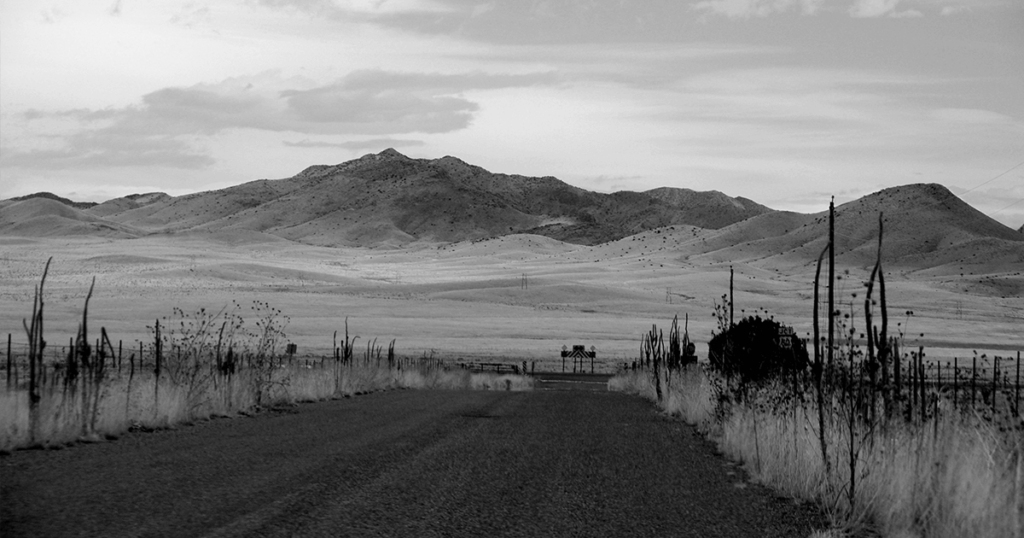
Out at 6 A.M. on a walk in Magdalena, New Mexico, last month on my first morning there, I was the only person on the street. That often seems to be the case, no matter what the hour, on my visits to this small town where my mother lives. Between the Magdalena Mountains to the south and the Bears to the north, the town lies on a high plain, bullied by the sun, mostly unadorned by trees, no river running through it. Many old adobe and old frame houses are in ruins, newly refinished houses and an occasional new construction sit among the old, and all along the wide streets are empty lots full of dry weeds. It’s a ragtag town, just resting there.
What a wonderful mishmash, I think, so different from the mishmash of a mountain village in Asturias, where I live in Spain. There, the older houses huddle together, sharing walls, the taller buildings rising on the shoulders of the shorter as if they were clambering up and over them to escape the damp cracks and crevices of the mountains, while abandoned houses, stones dripping moss, collapse at the doorsteps of the new. The wind comes, and you hear the old houses moan from it pressing on their bones. In Magdalena, the houses don’t moan; they sigh and settle, bow their heads, and endure.
But how do they endure the sun and wind, year after year, I wondered as I walked along in the brightening morning, a few birds, the dogs behind fences, and the cottontails on the wide streets my only company. Then, at the intersection of Third Street and Kelly Road, a young fellow appeared out of the haze of light from the rising sun, walking toward me. “Hello,” he greeted me, and I, surprised, returned the greeting, “Hello.”
In Spain, two people passing each other might nod, or they might say hasta luego, goodbye, that and not hello being the usual greeting. It took me a while to learn this. In the early years, hearing my automatic hellos in passing met with their goodbyes, I’d kick myself. “Oh, that’s right!” I’d think, reminded of the Spanish custom too late to adhere to it. I’d go on, the refrain of the Beatles’ song on my mind: “You say goodbye and I say hello / Hello hello / I don’t know why you say goodbye, I say hello.”
But those are acquaintances. With strangers, you offer at most a close smile and a nod, nothing like the greeting of the young man.
He was wearing long black shorts and a black hoodie, and he carried a plastic drink mug. He smiled as he shuffled across Kelly and closer to me. “How are you this morning?” he asked.
“I’m fine,” I answered. “How are you?”
When I told my mother over breakfast about the pleasant young fellow and how that exchange just wouldn’t happen in Spain, she remembered reading Germaine Greer’s account of learning on a visit to the United States that you have to say hello not only to everyone you know on the street but to everyone you don’t know from Adam. My mother added that Americans also talk to waiters more than Europeans do, and I thought that was possibly true. If not more, then at least differently. Where are you from? How long have you worked here? What are your aspirations in life? Those are questions I had when I was waiting tables as a 20-year-old in my hometown. In Spain, you’d never presume to pry into the waiter’s life or mind, though when he brings your food you might chide your child to sit still or else the waiter will be angry with him. “He’ll tell you so himself.” When the child stares up at him, the waiter will nod, saying that what’s more, he’ll bring dessert only to children who keep out from underfoot and don’t require scolding. You bring the waiter into your conversation instead of stepping out of yours to affably interrogate him.
The boy in black and I wished each other a pleasant day, smiled again, and moved on past one another. “Good-bye,” he said. “Good-bye,” I answered. The sun was just clearing the high school at the end of Third, no longer in my eyes, as I turned onto Kelly. All down the street the houses stood, patient watchers. As I walked along, they seemed to raise their eyes. “Hello, hello,” they whispered. Two weeks later, on my last morning, I walked along, still the only one on the street at that hour, the sun just topping Magdalena Ridge. Goodbyes are hard, but I’d be back. I hummed my own song as I walked. “We say hello and we say goodbye, oh I don’t know why we say goodbye.”

